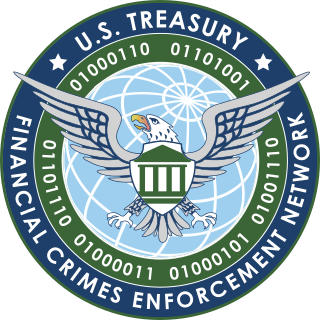Related Research Articles

Money laundering is the process of illegally concealing the origin of money, obtained from illicit activities such as drug trafficking, corruption, embezzlement or gambling, by converting it into a legitimate source. It is a crime in many jurisdictions with varying definitions. It is usually a key operation of organized crime.

The Financial Crimes Enforcement Network (FinCEN) is a bureau of the United States Department of the Treasury that collects and analyzes information about financial transactions in order to combat domestic and international money laundering, terrorist financing, and other financial crimes.

The Bank Secrecy Act of 1970 (BSA), also known as the Currency and Foreign Transactions Reporting Act, is a U.S. law requiring financial institutions in the United States to assist U.S. government agencies in detecting and preventing money laundering. Specifically, the act requires financial institutions to keep records of cash purchases of negotiable instruments, file reports if the daily aggregate exceeds $10,000, and report suspicious activity that may signify money laundering, tax evasion, or other criminal activities.

Know Your Customer (KYC) guidelines and regulations in financial services require professionals to verify the identity, suitability, and risks involved with maintaining a business relationship with a customer. The procedures fit within the broader scope of anti-money laundering (AML) and counter terrorism financing (CTF) regulations.
Australian Transaction Reports and Analysis Centre (AUSTRAC) is an Australian government financial intelligence agency responsible for monitoring financial transactions to identify money laundering, organised crime, tax evasion, welfare fraud and terrorism financing. AUSTRAC was established in 1989 under the Financial Transaction Reports Act 1988. It implements in Australia the recommendations of the Financial Action Task Force on Money Laundering (FATF), which Australia joined in 1990.

Anti-Money Laundering (AML) refers to a set of policies and practices to ensure that financial institutions and other regulated entities prevent, detect, and report financial crime and especially money laundering activities. Anti-Money Laundering is often paired with the action against terrorism financing, or Combating the Financing of Terrorism, using the acronym AML-CFT. In addition arrangements intended to ensure that banks and other relevant firms duly report suspicious transactions, the AML policy framework includes financial intelligence units and relevant law enforcement operations.
A Customer Identification Program (CIP) is a United States requirement, where financial institutions need to verify the identity of individuals wishing to conduct financial transactions with them and is a provision of the USA Patriot Act. More commonly known as know your customer, the CIP requirement was implemented by regulations in 2003 which require US financial institutions to develop a CIP proportionate to the size and type of its business. The CIP must be incorporated into the bank's Bank Secrecy Act/Anti-money laundering compliance program, which is subject to approval by the financial institution's board of directors.
Virtual currency, or virtual money, is a digital currency that is largely unregulated, issued and usually controlled by its developers, and used and accepted electronically among the members of a specific virtual community. In 2014, the European Banking Authority defined virtual currency as "a digital representation of value that is neither issued by a central bank or a public authority, nor necessarily attached to a fiat currency but is accepted by natural or legal persons as a means of payment and can be transferred, stored or traded electronically." A digital currency issued by a central bank is referred to as a central bank digital currency.
Anti-money laundering (AML) software is software used in the finance and legal industries to help companies comply with the legal requirements for financial institutions and other regulated entities to prevent or report money laundering activities. AML software can facilitate faster and more accurate compliance and investigations.
In financial regulation, a politically exposed person (PEP) is one who has been entrusted with a prominent public function. A PEP generally presents a higher risk for potential involvement in bribery and corruption by virtue of their position and the influence they may hold. The terms "politically exposed person" and senior foreign political figure are often used interchangeably, particularly in international forums.
A payment processor is a system that enables financial transactions, commonly employed by a merchant, to handle transactions with customers from various channels such as credit cards and debit cards or bank accounts. They are usually broken down into two types: front-end and back-end.
Reliance authentication is a part of the trust-based identity attribution process whereby a second entity relies upon the authentication processes put in place by a first entity. The second entity creates a further element that is unique and specific to its purpose, that can only be retrieved or accessed by the authentication processes of the first entity having first being met.

Bitcoin ATMs are kiosks that allow a person to purchase Bitcoin and other cryptocurrencies by using cash or debit card. Some Bitcoin ATMs offer bidirectional functionality, enabling both the purchase of Bitcoin and the sale of Bitcoin for cash. In some cases, Bitcoin ATM providers require users to have an existing account to transact on the machine.
Ripple Labs, Inc. is an American technology company which develops the Ripple payment protocol and exchange network. Originally named Opencoin and renamed in 2015, the company was founded in 2012 and is based in San Francisco, California.
A cryptocurrency tumbler or cryptocurrency mixing service is a service that mixes potentially identifiable or "tainted" cryptocurrency funds with others, so as to obscure the trail back to the fund's original source. This is usually done by pooling together source funds from multiple inputs for a large and random period of time, and then spitting them back out to destination addresses. As all the funds are lumped together and then distributed at random times, it is very difficult to trace exact coins. Tumblers have arisen to improve the anonymity of cryptocurrencies, usually bitcoin, since the digital currencies provide a public ledger of all transactions. Due to its goal of anonymity, tumblers have been used to money launder cryptocurrency.
Onfido is a technology company that helps businesses verify people's identities using a photo-based identity document, a selfie and artificial intelligence algorithms. It was founded in July 2012 by three former students at Oxford University: Co-founder Husayn Kassai, Co-founder Eamon Jubbawy, and Chief Architect Ruhul Amin. Onfido is headquartered in London and has over 650 employees in offices in San Francisco, Albuquerque, New York, Lisbon, Paris, Berlin, Amsterdam, Delhi, Mumbai, Bangalore and Singapore.
Kyckr is a business register to help with know your customer (KYC) processes for anti-money laundering regulations. It was established in Ireland, and was a publicly traded company on the Australian Securities Exchange with operations in Ireland and Australia. The company delisted on 07 November 2022 when it was acquired by RealWise KYK AV Pty Ltd.
Cryptocurrency and crime describe notable examples of cybercrime related to theft of cryptocurrencies and some methods or security vulnerabilities commonly exploited. Cryptojacking is a form of cybercrime specific to cryptocurrencies that have been used on websites to hijack a victim's resources and use them for hashing and mining cryptocurrency.
Decentralized finance offers financial instruments without relying on intermediaries such as brokerages, exchanges, or banks by using smart contracts on a blockchain, mainly Ethereum. DeFi platforms allow people to lend or borrow funds from others, speculate on price movements on assets using derivatives, trade cryptocurrencies, insure against risks, and earn interest in savings-like accounts. DeFi uses a layered architecture and highly composable building blocks. Some applications promote high-interest rates but are subject to high risk. Coding errors and hacks have been common in DeFi.

The Anti-Money Laundering Improvement Act (AML) is a collection of regulations and laws in the United States aimed at combating money laundering and terrorist financing. The act builds upon the Bank Secrecy Act (BSA), the first anti-money laundering enforcement law.
References
- ↑ "Risk Management – Fighting Fraud with Digital Verification Tools". www.rmmagazine.com. Retrieved 2018-09-10.
- ↑ Lukonga, Ms Inutu (2018-09-11). Fintech, Inclusive Growth and Cyber Risks: Focus on the MENAP and CCA Regions. International Monetary Fund. ISBN 978-1-4843-7490-0.
- ↑ "How to use AI to fight identity fraud | TechBeacon". TechBeacon. Retrieved 2018-08-08.
- ↑ Lohr, Steve (2018-02-09). "Facial Recognition Is Accurate, if You're a White Guy". The New York Times. ISSN 0362-4331 . Retrieved 2021-05-25.
- ↑ "The case for digital IDs" (PDF). TechUK. 1 February 2019. Retrieved 18 April 2019.
- ↑ "Requirements for Certain Transactions Involving Convertible Virtual Currency or Digital Assets". Federal Register. 2020-12-23. Retrieved 2021-02-09.
- ↑ PYMNTS (2021-02-04). "Crypto Regulations Show Need For ID Verification". www.pymnts.com. Retrieved 2021-02-09.